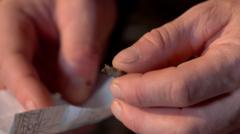Survivors of Joel Le Scouarnec's decades-long abuse campaign are appalled by a sentence that lacks preventative detention. Critics argue the punishment is insufficient given the severity and scale of his crimes.**
Discontent Brews Over Short Sentence for Notorious Child Abuser**

Discontent Brews Over Short Sentence for Notorious Child Abuser**
Victims of a French paedophile surgeon express outrage at his 20-year sentence, fearing for their safety upon his potential early release.**
Former French surgeon Joel Le Scouarnec, aged 74, has been handed a 20-year prison sentence for sexually abusing hundreds of his patients, predominantly minors. This ruling has incited profound anger and disillusionment among his victims, who are deeply concerned about the absence of preventative detention in his case, which could permit his release as early as 2032.
During the trial, Le Scouarnec confessed to 111 rapes and 188 sexual assaults, leading prosecutors to label him "a devil in a white coat." While they sought a longer sentence and preventative measures, the presiding judge opted against this, citing Le Scouarnec’s age and reported intentions to make amends. He is eligible for parole after serving two-thirds of his sentence, which raises fears among those he victimized.
Many victims, who attended the trial, expressed shock and desperation regarding the leniency of the ruling. "For a robbery, you risk 30 years. But the punishment for hundreds of child rapes is lighter?" lamented one survivor. The president of a child advocacy group, Solène Podevin Favre, emphasized her disappointment in the lack of a more severe penalty, suggesting that a longer sentence was warranted given the number of victims.
Legal representatives voice concerns as well, with Francesca Satta arguing that 20 years feels woefully short given the extensive nature of the crimes. Judge Aude Burési recognized that while victims wanted assurance that Le Scouarnec would never walk free again, the legal system does not accommodate such demands.
Calls for reform are gaining traction, with victims like Amélie Lévêque advocating for harsher penalties that reflect the serial nature of such heinous acts. Advocates from various sectors, including justice and public safety, express a unified stance that the law should evolve to protect future generations from similar predators.
Public outrage is palpable, with many asserting that enhanced judicial measures are necessary to reflect the gravity of child abuse. As the court’s decision settles, the legal community and victims’ advocates continue to grapple with the legacy of Le Scouarnec's crimes and the imperative for legislative change to avoid future injustices.






















